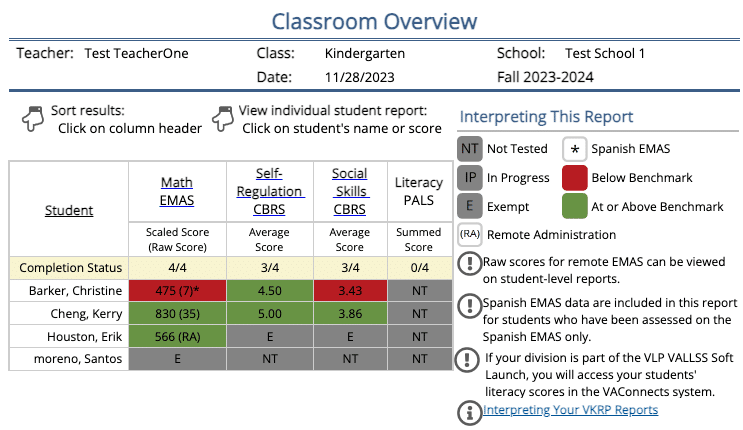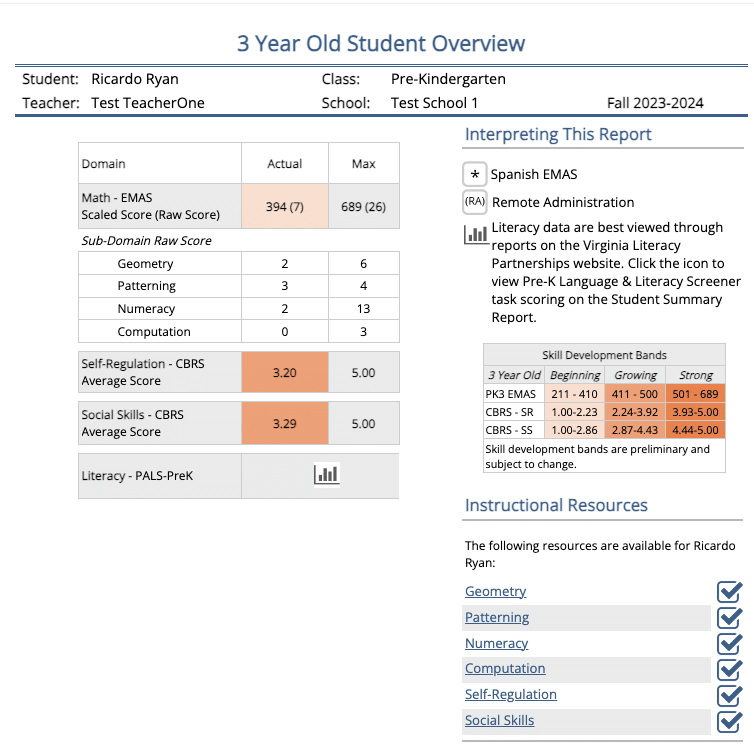VKRP 2023 Pre-K and Kindergarten Reports

If you are a public pre-k or kindergarten teacher in Virginia, chances are that some time over the last month you finished your VLP and VKRP assessments of literacy, mathematics, self-regulation, social skills, and mental health well-being. If you haven’t already, soon you’ll be reviewing reports and talking to your colleagues about how to interpret and use the data.
What can the reports tell you, and how can you use the information to drive instruction in the coming months?
The Basics
VKRP is not just a set of assessments. It is also a reporting system that gives a detailed snapshot of children’s strengths and areas for growth. These reports included detailed, actionable information to assist teachers, leaders, policy makers, and others to work towards providing each and every child with opportunities and resources to succeed in school.
If you have limited time, there are two key reports to focus on:
- The Classroom Overview, which includes each student’s scores.
- The Student Overview, which shows one student’s scores at a time.
The Classroom Overview tells you, at a glance, how students are doing across the assessment domains. The Student Overview allows you to focus on a particular student and view results in greater detail. (Growth Reports, which show how students have changed across the school year, will be available after spring assessments.)
Kindergarten Reports
Kindergarten reports include benchmarks. The benchmarks indicate whether students are meeting minimum expectations in each domain. They were developed using developmental expectations in conjunction with data collected across the Commonwealth over the 2015-2019 VKRP pilot phase. Teachers and content experts also reviewed each assessment and suggested the minimum score or rating that would indicate the student was on track to meet learning standards. More detailed information about the benchmarks can be found in the kindergarten Interpreting Reports document.
There are two important things to remember about the benchmarks:
- The benchmarks are not a goal or target. They are meant to signal a students’ risk of falling behind.
- Some students start kindergarten with scores already above the fall benchmark and remain above the benchmark in the spring. Others may start below the benchmark and end below the benchmark, even though they made substantial gains across the school year. The benchmarks just put students’ scores into context relative to typical, minimum expectations.
- Some students start kindergarten with scores already above the fall benchmark and remain above the benchmark in the spring. Others may start below the benchmark and end below the benchmark, even though they made substantial gains across the school year. The benchmarks just put students’ scores into context relative to typical, minimum expectations.
- Teachers should closely monitor students whose scores fall below, at, or just above the benchmark on one or more assessments.
- These students may need extra support to keep them on track to meet developmental goals.

Pre-kindergarten Reports
Young children enter and end pre-kindergarten with a wide range of early learning skills; therefore, the mathematics, self-regulation, and social skills assessment tools measure children’s skills along a developmental continuum. To help teachers interpret and use their pre-kindergarten VKRP data, VKRP uses Skill Development Bands within VKRP reports that categorize children’s skills as falling into one of three developmental ranges for mathematics, self-regulation, and social skills: Beginning, Growing, and Strong. Separate bands were established in the fall and spring to represent children’s skill development in each domain as compared to expectations at a particular point in time. The pre-k Interpreting Reports document provides score ranges for each of the three bands.
- Children whose skills fall within the Beginning Band are starting to develop skills in the early learning domain and may need extra support to reach developmental goals.
- Children whose skills fall within the Growing Band are building towards readiness in the early learning domain as expected and may require additional supports to ensure that they remain on track to meet developmental goals.
- Children whose skills fall within the Strong Band have strong early foundational skills in the early learning domain and may thrive from extra challenge.
All children at this age continue to need developmentally appropriate, engaging, and stimulating instruction and support to grow their early learning skills.
Many pre-k teachers and leaders ask us, “Why don’t you provide benchmarks in pre-k?” The answer is that we don’t want to imply that children are “ready” or “not ready” for pre-k in the fall, and we don’t want scores on the VKRP assessments to be used to determine who enrolls in kindergarten in the spring. By providing information about Skill Development Bands instead, we hope to provide teachers with the guidance they need to interpret and use VKRP data in pre-k. See below for a sample student overview report for a three-year-old student.

More Reports and More Information
VKRP provides many other classroom-level and student-level reports. Additionally, Family Information Reports is available to share with families. We hope that VKRP can be used to support children in their continual development and growth during their early education.
If your school would like additional VKRP support on how to use reports, interpret data, or in hosting a VKRP data use training, please contact:
- Wanda Weaver, VKRP Director of Outreach, at vkrp@virginia.edu or by telephone at (866) 301-8278
More Questions for the VKRP Team? VKRP provides support via the online chat feature when you are in the system, via email vkrp@virginia.edu, and via toll free 866-301-8278

